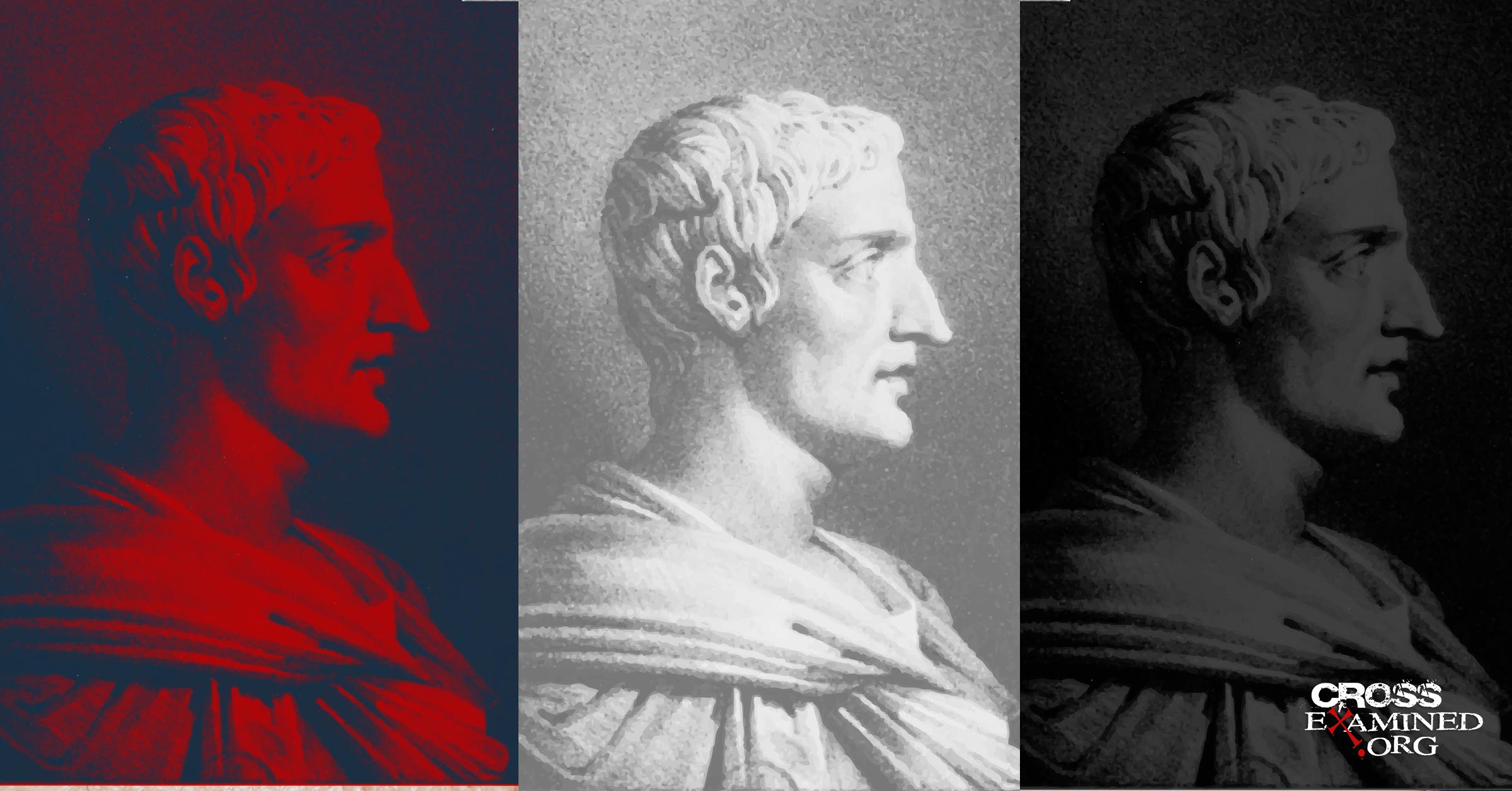Most of what happened in the ancient world went unrecorded. Think about it. People from bygone eras didn’t have technology like YouTube, TV, or the internet — much less the printing press. It’s sad, really. We’ll never know about 99.99% of what happened back then. The less than 1% we do know is because a few literate historians covered the highlights.
We know about famous military commanders and epic battles. Emperors and politicians of powerful kingdoms also make the cut. But most events and people have vanished off the historical landscape.
With Jesus of Nazareth, though, we have four biographies on his life all dating within the lifetime of eye-witnesses. We also have a slew of letters by some of his other followers, making him one of the best-attested individuals in the history of the ancient world. It’s quite remarkable considering he came from a backwoods section of Galilee far removed from prominent Roman locations.
Historians normally gush over this amount of material. The amount and quality of sources towers just about everyone else. Yet some skeptics cry foul. They don’t accept the Gospels or New Testament letters for the reason that they’re Christian documents.
Well, as it turns out, we have other, non-Christian sources also testifying to Jesus. One such source comes from the pen of an early Roman historian named Tacitus. As you’ll see, Tacitus corroborates significant events from the New Testament.
Tacitus, the Greatest Roman Historian
Cornelius Tacitus (AD 55-120) is often called the “greatest historian” of ancient Rome. He authored two large works — the Annals and the Histories.
Much of what he wrote is now lost to us. Fortunately, there’s one remaining portion which is of interest to this discussion. The portion describes Nero blaming the Christians for the great fire of Rome (AD 64). It reports:
Therefore, to stop the rumor, Nero substituted as culprits and punished in the utmost refinements of cruelty, a class of men, loathed for their vices, whom the crowd styled Christians. Christus, the founder of the name, had undergone the death penalty in the reign of Tiberius, by sentence of the procurator Pontius Pilatus, and the pernicious superstition was checked for a moment, only to break out once more, not merely in Judea, the home of the disease, but in the capital itself, where all things horrible or shameful in the world collect and find a vogue.1
What do we learn from Tacitus’ work?
- Christians are named after their founder, Christus.
- Christus died by the death penalty during Emperor Tiberius’ reign (AD 14-37).
- Pontius Pilatus, procurator (AD 26-36), sentenced Christus to death.
- Christus’ death ended the “pernicious superstition” for only a short time.
- The “pernicious superstition” broke out once more in Judea, the “home of the disease.”
- The “disease” spread all the way to Rome and had a large enough following to receive blame for the great fire.
Doubting Tacitus?
As is abundantly obvious, Tacitus’ quote provides a significant amount of corroboration for the New Testament. Jesus died by crucifixion during the reign of Tiberius while Pilatus was procurator of Judea. Moreover, the movement was only “checked for a moment, only to break out once more.”
The implications for this last quote are massive, to say the least. As J.N.D. Anderson remarks:
It is scarcely fanciful to suggest that when he adds that “a most mischievous superstition, thus checked for the moment, again broke out” he is bearing indirect and unconscious testimony to the conviction of the early church that the Christ who had been crucified had risen from the grave.2
On the face of it, Tacitus makes massive claims in support of the New Testament, which is why skeptics try to dismiss it. And they usually give four reasons for doing so.
“It’s a Christian Interpolation”
Skeptics argue that Christians inserted this portion of the text at a later date, but there is no compelling reason for believing this. First and foremost, it’s difficult to imagine a Christian describing his movement as a “pernicious superstition” and a “disease.” As a general rule, people don’t usually label themselves this way.
Furthermore, if Christians really inserted this text into Tacitus’ work, they certainly could have been more clear about Jesus’ resurrection. While the claim that the “superstition broke out again in Judea” implies a resurrection, it’s not entirely clear.
It seems that if Christians had the opportunity to insert a paragraph here, they would have said something more explicit.
“It’s Anachronistic”
A second argument skeptics make against this quote is that it refers to Pilatus as “procurator” — the title during Tacitus’ day — instead of “prefect” — the title during Jesus’ day. That is, it’s anachronistic, and therefore, unreliable.
Again, as a reminder, Tacitus’ reputation as an accurate historian is without question.3 Be that as it may, what should we make of the skeptics’ claim?
First, we should note that Tacitus may have intentionally used the term his readers would have been familiar with for clarity sake. For example, I might write about a “bishop” from the second century, but call him a “pastor” for a contemporary audience because that’s a term readers are familiar with. There’s no reason why Tacitus couldn’t have employed this tactic.
Second, we should also note that other Jewish historians of the first century — Philo and Josephus — both refer to Pilate as a “procurator.” While the term “prefect” was legitimate, it appears that both “procurator” and “prefect” are used interchangeably.
“It’s Hearsay”
Third, skeptics reject this as an original source and claim that Tacitus was simply repeating hearsay from Christians. One line of evidence they suggest is that Tacitus uses Jesus’ title “Christus” rather than his legal name “Jesus.”
This argument doesn’t hold water either. In response, we need to remember that Tacitus was writing about Christians and the origin of their name, so his use of “Christus” instead of “Jesus” seems logical.
Second, it’s difficult to imagine that a great historian like Tacitus, who elsewhere carefully investigated sources, would simply jot down hearsay from a group of Christians. Moreover, I wonder why Tacitus would blindly trust this group he refers to as a “pernicious superstition” and a “disease” and include their fables about Jesus in his history if he didn’t have any other source to substantiate his claim.
While making a substantial claim about a Roman official condemning someone to death, Tacitus would have been especially motivated to get his facts straight.
“It’s Unofficial”
Finally, skeptics argue that Tacitus wouldn’t have had access to any official records that would record Jesus’ death. But I find this terribly unpersuasive.
For starters, Tacitus himself held high government positions (proconsul of Asia). Additionally, he had close connections with others in power, such as Pliny the Younger and his wife, who happened to be the daughter of Julius Agricola, the governor of Britain. It seems silly to suggest he wouldn’t have had access to government records.
Furthermore, we know he had access to the Acta Senatus (archives of the Roman Senate’s activities) as he cites it multiple times in his works. Jesus’ crucifixion may very well have appeared in these archives or in others similar to it.
Knowing the kind of historian Tacitus was, if he didn’t have iron-clad proof that Pontius Pilate sanctioned Jesus’ crucifixion, he would have couched his statement with “Christians report that…” rather than making an unequivocal claim.
Good Corroborating Evidence
In the end, the Tacitus text stands up to scrutiny and provides solid corroborating evidence for the New Testament. While he views Christians in a negative light, he proves to be a reliable non-Christian source for major events in Jesus’ life.
Recommended resources related to the topic:
Cold-Case Christianity: A Homicide Detective Investigates the Claims of the Gospels by J. Warner Wallace (Book)
The New Testament: Too Embarrassing to Be False by Frank Turek (MP3) and (DVD)
Why We Know the New Testament Writers Told the Truth by Frank Turek (mp4 Download)
The Top Ten Reasons We Know the NT Writers Told the Truth mp3 by Frank Turek
Ryan Leasure holds a Master of Arts from Furman University and a Masters of Divinity from the Southern Baptist Theological Seminary. He currently serves as a pastor at Grace Bible Church in Moore, SC.
Original Blog Source: http://bit.ly/2mHGbT0


















Facebook Comments